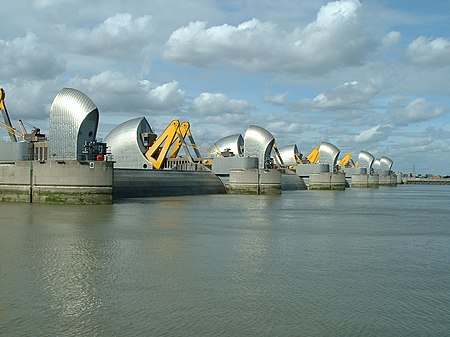Economics of climate adaptation
| Subject classification: this is an economics resource. |
|
Economics of Climate Adaptation
|
|
Economics and Climate Adaptation Q & A
|
The economics of climate adaptation: concepts and application
editAdapting to climate change presents unique challenges for economists in terms of how the problems can be framed and analysed. In this workshop, we will examine a range of ways in which economics has recently been applied to adaptation problems.
Topics related to the economics of climate adaptation include:
- Conceptualising and coping with uncertainty
- Complex and wicked adaptation problems
- The real options approach to uncertainty in cost-benefit analysis; and,
- Institutional analysis, design and transitions.
"There are known knowns; there are things we know that we know.
There are known unknowns; that is to say there are things that, we now know we don't know.
But there are also unknown unknowns – there are things we do not know we don't know".
Reference material and readings
edit- Batie 2008 Wicked problems and applied economics
- Dobes 2010 Notes on applying ‘real options’ to climate change adaptation measures, with examples from Vietnam
- Dobes 2011 Chapter 5 Fiscal aspects of adaptation to climate change
- Dobes 2012 Adapting to climate change - formulating policy under uncertainty
- Dobes and Chapman 2011 Financing Adaptation to Climate-Induced Retreat from Coastal Inundation and Erosion
- Hertzler 2007 Adapting to climate change and managing climate risks by using real options
- Marechal 2007 The economics of climate change and the change of climate in economics
- Nelson 2011 Ethics and the economist - What climate change demands of us
- Ranger and Garbett-Shiels 2011 How can decision-makers in developing countries incorporate uncertainty about future climate risks into existing planning and policy processes
- Reeder and Ranger 2011 How do you adapt in an uncertain world Lessons from the Thames Estuary 2100 project
- Rodima-Taylor et al 2012 Adaptation as innovation, innovation as adaptation - An institutional approach to climate change
- Scrieciu et al 2011 Pushing the boundaries of climate economics - critical issues to consider in climate policy analysis
- Wegner and Pascual 2011 Cost-benefit analysis in the context of ecosystem services for human well-being - A multidisciplinary critique
Discussion points based on relevant readings and references
editBatie (2008) "Wicked problems and applied economics"
Climate change is an example of a wicked problem. Batie (2008 p. 1176) argued that applied economics needs to become more familiar with wicked problems if it is to remain relevant because conventional scientific methods are inadequate for dealing with wicked problems in a policy context - the “identification of solutions becomes as much a social and political process as it is a scientific endeavor (Kreuter et al. 2004)” (Batie 2008, p. 1176). Wicked problems, also called "social messes or untamed problems" are complex, ill-structured, ever-changing public problems, that are difficult to identify and model, intractable, and are never actually solved (Rittel and Webber 1973; Conklin 2006).
King (2012) "The science of design"
"Design is the process of conceptualizing or inventing new artifacts—the process of devising new ways for people to better adapt to or use the natural world around them." (King 2012, p. 275)
"Simon’s work has been the starting point for efforts by scholars in diverse fields, including economics, to develop a general understanding of a science of design (Baldwin and Clark 2000; Cross 1984, 2010; Hevner et al. 2004; Milgrom 2011; Norman 2002; Petroski 2003; Roth 2002)." (King 2012, p. 275)
"While economic analysis is motivated by a question or a puzzle and focuses on explaining what is and predicting what will be, economic design is motivated by a problem or opportunity and focuses on what can be and ought to be or on what will yield a satisfactory outcome. Specific purposes and goals are the starting point for economic design. Often these are messy, ill specified, and subject to conflict (Rittel and Webber 1973)." (King 2012, p. 276)
Marechal (2007) "The economics of climate change and the change of climate in economics"
Marechal (2007, p. 5181) argued that traditional economics is being challenged, empirically and theoretically, by scholars in other fields and should therefore be open to insights from other disciplines. Marechal (2007, p. 5181) offer insights from an evolutionary and historical perspective of technological change.
"Altogether, this confirms the need to look at technological change through the aforementioned three-dimensional co-evolutionary framework (shown in Fig. 1). Analysing technical evolution through this type of perspective shows the importance of contingencies, feedbacks and dynamic interactions and thus renders inevitable to acknowledge the emergent, complex and uncertain nature of economic evolution." (Marechal, 2007, p. 5191)
Nelson (2011) "Ethics and the economist - What climate change demands of us"
"A discipline of economics based on Enlightenment notions of mechanism and disembodied rationality is not suited to present problems. This essay suggests three major requirements: first, that we take action; second, that we work together; and third, that we focus on avoiding the worst, rather than obtaining the optimal. The essay concludes with suggestions of specific steps that economists should take as researchers, teachers, and in our other roles." Nelson (2011)
Ranger and Garbett-Shiels (2011) "How can decision-makers in developing countries incorporate uncertainty about future climate risks into existing planning and policy processes"
"This paper sets out simple, practical principles that aim to reduce the impact of uncertainty on decision-making. It also draws out three interconnected messages for decision-makers. Firstly, for adaptation to be effective, comprehensive and implemented at the appropriate scale, it is crucial to integrate adaptation planning within existing priorities, planning processes and policy-making. Secondly, adaptation strengthens the case for pushing ‘faster and harder’ on development priorities. Finally, by building flexibility into adaptation strategies from the outset, increasing climate resilience, even with deep uncertainty about future impacts, should be no more challenging than other areas of policy."
Topics in the Economics of Climate Adaptation
editThere are alternative ways of framing adaptation as an economic problem. Questions we might ask economists working to research this area include:
- How have you framed adaptation as an economic problem?
- What economic concepts and tools can be useful for analysing adaptation?
- How can your results and insights be used to help adaptation? i.e, What are the insights from your approach? Who should be paying attention to your results? How should these results or insights change their behaviour?
Topics 1, 2, 3, and 4 are relevant to the role of the economic analysis of decision-making, including the advantages and disadvantages of cost-benefit analysis and related approaches for climate adaptation.
Topic 1: Cost-benefit analysis to adaptation decisions for a long, uncertain future
editPlease add questions or comments about Topic 1 here.
Topic 2: Broad comparisons of alternative decision-making frameworks for managing uncertainty in adaptation
editwww.adaptation-decisions.com (from the NCCARF Uncertainty project)
Please add questions or comments about Topic 2 here.
Topic 3: Applying real options to climate adaptation
edit- Dobes 2010 Notes on applying ‘real options’ to climate change adaptation measures, with examples from Vietnam
- Dobes 2011 Chapter 5 Fiscal aspects of adaptation to climate change
- Dobes 2012 Adapting to climate change - formulating policy under uncertainty
- Dobes and Chapman 2011 Financing Adaptation to Climate-Induced Retreat from Coastal Inundation and Erosion
Please add questions or comments about Topic 3 here.
Topic 4: An example application of real options analysis to the optimal timing of adaptation decisions
edit- Hertzler 2007 Adapting to climate change and managing climate risks by using real options
Please add questions or comments about Topic 4 here.
Discussion topic: the usefulness of existing tools of economic analysis for climate change adaptation.
editPlease add questions or comments for general discussion about topics 1, 2, 3, and 4 here.
- Discussion topic: Discounting
- There are countless investment decisions being made with analysis by government economists who are nervously googling for advice on what discount rate(s) to enter in their spreadsheet. What should best practice for discounting be for infrastructure? Are we going to get a satisfactory number or discounting method for projects with long time frames and high uncertainty, or are we going to have to look at approaches outside/ in addition to the neoclassical cost benefit framework?
Topics 5, 6, and 7 are relevant to the role and analysis of institutions in climate adaptation.
Topic 5: Adapting institutions in island states for climate adaptation
editPlease add questions or comments about Topic 5 here.
Topic 6: The design and transition of institutions for adaptation
editPlease add questions or comments about Topic 6 here.
Topic 7: Examining how cultural values affect economic perceptions
editPlease add questions or comments about Topic 7 here.
Discussion topic: The frontiers of the economic analysis of climate adaptation.
edit
Please enter general questions or comments about the research agenda of economics and climate adaptation here.
- Is climate adaptation business-as-usual for economists?
- It seems that there has been some research on economic aspects of climate adaptation but economists have not necessarily been involved. Why?
- Does climate adaptation mean that economists need to move away from a problem-focused/analytical approach towards a solution-focused/design approach?
- Is the economics of climate adaptation simply another example of the analysis of market failure?
- Discussion topic: “Is economics delivering on its potential?”
- How well have existing economic theories and methods served you in analysing adaptation issues. What theory and concepts have been most useful? What aspects of economics did you find wanting? What economic theory, methods and application do you see as having untapped potential?
- Discussion topic: Market failure and the role of government
- How far should we take the market failure perspective in defining the role of government in relation to adaptation? What other theoretical perspectives could inform economists’ advice on the role of government?
- Discussion topic: Role of economics and economists in policy
- What roles can, or should, economists play in adapting legal polices, say those related to risks to private properties?
- Discussion topic: Implementation of novel institutions
- There are some suggestions for novel policy designs for coping with shocks and changing inundation risks. I think most economists would agree that current settings for dealing with these problems are not adequate, and that economic analysis can provide some useful ideas. However there seems to be significant barriers to getting these ideas seriously considered. What is an economist to do?
- Discussion topic: The disconnect between insurance theory and practice
- Why does there seem to be such a big disconnect between insurance practice and theory? Is it because the re-insurers are multinationals who are less interested in innovation at the local level? Where are there opportunities to implement innovative risk management/insurance approaches, and what the role of economists might be in making this happen?
- Comment: The role of economists is linking the multinationals who are keen to get more southern hemisphere exposure with something that makes sense to local farmers and communities.
- Comment: People are trying, but there is a lot of research needed before it will take off.
- Discussion topic: Equity
- Economics has some stock answers to how equity concerns should be considered in policy analysis. Are these adequate for addressing adaptation? If not what else should economists be doing?
- Discussion topic: Future research directions
- A hypothetical: You have an opportunity head a new centre for excellence in adaptation economics. What topics or problem do you focus on? What expertise do you want your postdocs to have?
- What should the economic societies be doing next to promote economics of adaptation? Should workshops be held at a national level on methods and concepts? Any other suggestions?
Please add more questions or comments for general discussion here.
|
Economics and Climate Adaptation Links
Links look like this: Help on editing this page
What does climate change mean for Australia?(on the NCCARF website) www.adaptation-decisions.com (from the NCCARF Uncertainty project)
Greg Hertzler (University of Sydney) |

